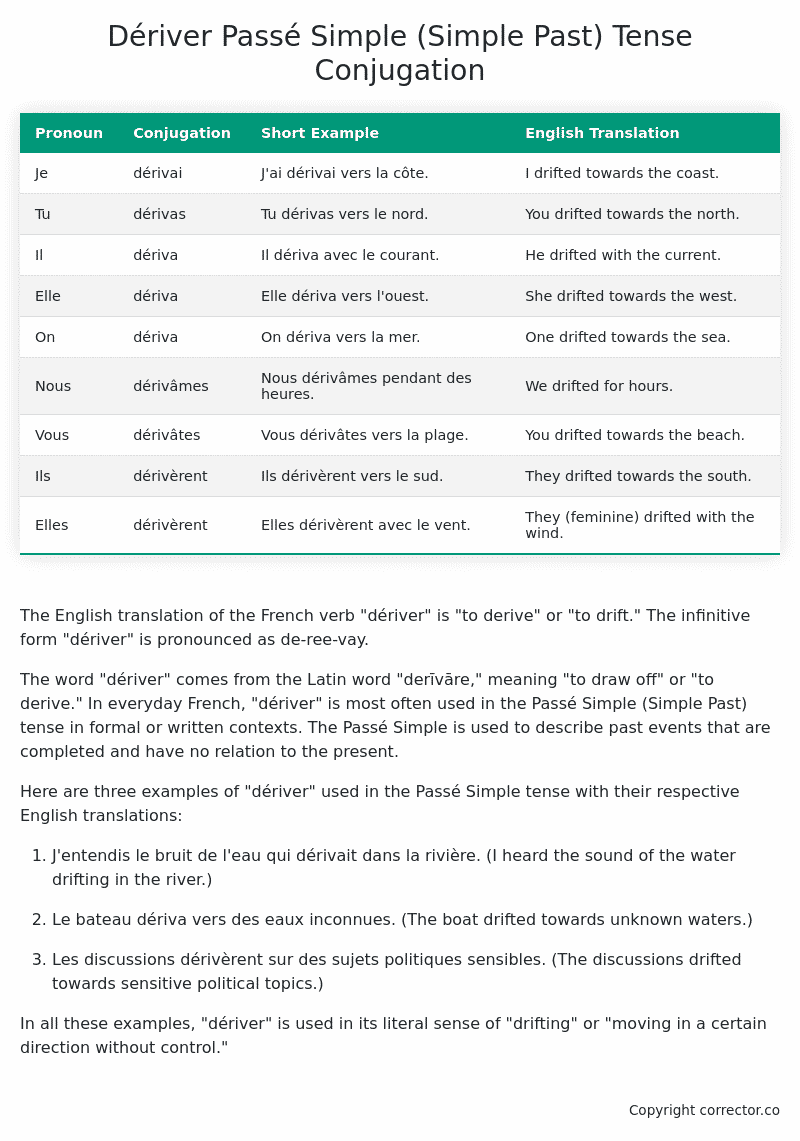Passé Simple (Simple Past) Tense Conjugation of the French Verb dériver
Introduction to the verb dériver
The English translation of the French verb “dériver” is “to derive” or “to drift.”
The infinitive form “dériver” is pronounced as de-ree-vay.
The word “dériver” comes from the Latin word “derīvāre,” meaning “to draw off” or “to derive.” In everyday French, “dériver” is most often used in the Passé Simple (Simple Past) tense in formal or written contexts. The Passé Simple is used to describe past events that are completed and have no relation to the present.
Here are three examples of “dériver” used in the Passé Simple tense with their respective English translations:
-
J’entendis le bruit de l’eau qui dérivait dans la rivière.
(I heard the sound of the water drifting in the river.) -
Le bateau dériva vers des eaux inconnues.
(The boat drifted towards unknown waters.) -
Les discussions dérivèrent sur des sujets politiques sensibles.
(The discussions drifted towards sensitive political topics.)
In all these examples, “dériver” is used in its literal sense of “drifting” or “moving in a certain direction without control.”
Table of the Passé Simple (Simple Past) Tense Conjugation of dériver
| Pronoun | Conjugation | Short Example | English Translation |
|---|---|---|---|
| Je | dérivai | J’ai dérivai vers la côte. | I drifted towards the coast. |
| Tu | dérivas | Tu dérivas vers le nord. | You drifted towards the north. |
| Il | dériva | Il dériva avec le courant. | He drifted with the current. |
| Elle | dériva | Elle dériva vers l’ouest. | She drifted towards the west. |
| On | dériva | On dériva vers la mer. | One drifted towards the sea. |
| Nous | dérivâmes | Nous dérivâmes pendant des heures. | We drifted for hours. |
| Vous | dérivâtes | Vous dérivâtes vers la plage. | You drifted towards the beach. |
| Ils | dérivèrent | Ils dérivèrent vers le sud. | They drifted towards the south. |
| Elles | dérivèrent | Elles dérivèrent avec le vent. | They (feminine) drifted with the wind. |
Other Conjugations for Dériver.
Le Present (Present Tense) Conjugation of the French Verb dériver
Imparfait (Imperfect) Tense Conjugation of the French Verb dériver
Passé Simple (Simple Past) Tense Conjugation of the French Verb dériver (You’re reading it right now!)
Passé Composé (Present Perfect) Tense Conjugation of the French Verb dériver
Futur Simple (Simple Future) Tense Conjugation of the French Verb dériver
Futur Proche (Near Future) Tense Conjugation of the French Verb dériver
Plus-que-parfait (Pluperfect) Tense Conjugation of the French Verb dériver
Passé Antérieur (Past Anterior) Tense Conjugation of the French Verb dériver
Futur Antérieur (Future Anterior) Tense Conjugation of the French Verb dériver
Subjonctif Présent (Subjunctive Present) Tense Conjugation of the French Verb dériver
Subjonctif Passé (Subjunctive Past) Tense Conjugation of the French Verb dériver
Subjonctif Imparfait (Subjunctive Imperfect) Tense Conjugation of the French Verb dériver
Subjonctif Plus-que-parfait (Subjunctive Pluperfect) Tense Conjugation of the French Verb dériver
Conditionnel Présent (Conditional Present) Tense Conjugation of the French Verb dériver
Conditionnel Passé (Conditional Past) Tense Conjugation of the French Verb dériver
Conditionnel Passé II (Conditional Past II) Tense Conjugation of the French Verb dériver
L’impératif Présent (Imperative Present) Tense Conjugation of the French Verb dériver
L’impératif Passé (Imperative Past) Tense Conjugation of the French Verb dériver
L’infinitif Présent (Infinitive Present) Tense Conjugation of the French Verb dériver
L’infinitif Passé (Infinitive Past) Tense Conjugation of the French Verb dériver
Le Participe Présent (Present Participle) Tense Conjugation of the French Verb dériver
Le Participe Passé (Past Participle) Tense Conjugation of the French Verb dériver
Struggling with French verbs or the language in general? Why not use our free French Grammar Checker – no registration required!
Get a FREE Download Study Sheet of this Conjugation 🔥
Simply right click the image below, click “save image” and get your free reference for the dériver Passé Simple tense conjugation!

Dériver – About the French Passé Simple (Simple Past) Tense
Formation
Usage
Narration
Historical Context
Interactions with other tenses
Passé Composé
Imparfait
Conditional and Subjunctive
Summary
I hope you enjoyed this article on the verb dériver. Still in a learning mood? Check out another TOTALLY random French verb conjugation!


